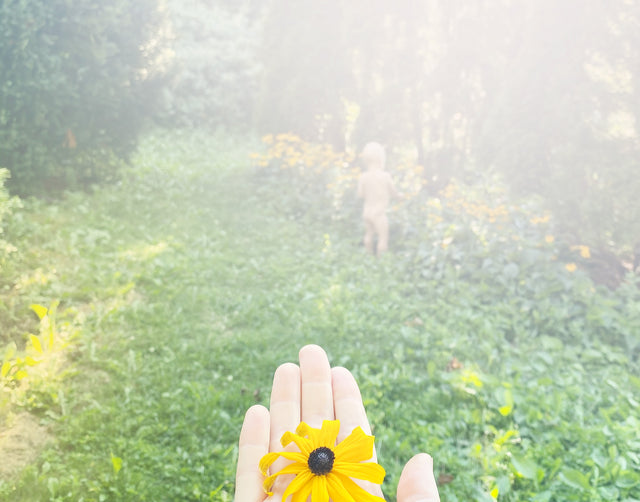Raising great kids: How to be with our children
When it comes to raising great kids, there is a question that stands out among the rest.

It's the question I see floating around in the minds of parents with families that prioritize connection and secure attachment.
It's the question that I find myself asking when I'm having one of those great parenting days and that I know I'm forgetting when I'm not.
It's the question I share with strangers who comment about how gentle, patient, and clear I'm being with 3 children in a busy supermarket. Or the lovely lady at my bank's call centre who, after nearly 10 interruptions from my 3 year old, shared that she one day wants to have children and that she hoped she could parent with "that kind of love and kindness".
"Does this matter?"
Explored, this question enlightens us, eliciting all that aligns with our core values and truest being, and letting the rest melt away.
Unexamined, it weighs heavy on us with fear, guilt, and loneliness amongst those we love most.
The deeper parenting question
It's taken nearly a decade of reading, practicing, and at times failing at conscious parenting, respectful parenting, and Montessori-inspired parenting for me to take this question from it's simplest form into a deeper inquiry that has led me to what many of us truly want to know when it comes to being with our young children.
"If I want my children to grow up to be confident, creative, self-directed adults with secure attachment to their parents and the capacity to connect with others in meaningful and fulfilling relationships, what aspects of my parenting matter in their early years?"
The clarity of our question will determine the quality of our answer, and ultimately the result of our time with our little ones. And while our lives and relationships are more complex than we can account for, we are all bound to the universal law of attraction - that is that like will attract like.
By clearly articulating our parenting goals we're already closer to realizing them.
Being with our children in the ways that matter
Unconditional Love and Acceptance
The kind of nurturing and loving environment where they feel valued and accepted for who they are, critical for building their self-esteem and creating a secure attachment to their parents. Dr. Shefali Tsabury advocates for this in her book The Awakened Family - “Do you see me?” This is the big question your child is asking every day. “Can you recognize me for who I am, different from your dreams and expectations for me, separate from your agenda for me?”
Emotional Support and Validation
When we encourage our children to express their emotions openly and provide them with support and validation, we open up the opportunity to model healthy ways to manage their feelings and help them develop emotional intelligence. Dr. Daniel J. Seigel and author of The Whole Brain Child tell us that "From early infancy, it appears that our ability to regulate emotional states depends upon the experience of feeling that a significant person in our life is simultaneously experiencing a similar state of mind."
Active Listening and Communication
Gosh it can be hard when there's many voices asking for your attention but make sure to create space to practice active listening to understand your child's thoughts, feelings, and concerns. Just like you would with a close friend, speak with them, using open and honest communication, encouraging them to express themselves. These are the moments that foster the strong parent-child relationship we are seeking.
Setting Boundaries and Discipline
If you've visited Instagram lately, you'll see child psychologists clarifying that Gentle Parenting is not permissive parenting. Communicating clear and age-appropriate boundaries provides structure and guidance - respectful and gentle parenting at it's best!
As parents, it's important to model setting and holding boundaries. When our kids naturally explore the limits of those boundaries (totally normal and expected!), we can protect the relationship by returning to the root of discipline, which is to teach.
Allow natural consequences to do what they do best - teach, allowing us to join our children as problem solvers and collaborators. But sometimes the consequence aren't easily perceived by our little ones (ex. not leaving at the time we all agreed to go home for dinner), giving us an opportunity to share more about how our world and society works and inviting them in as important members of the team.
Encouraging Independence and Decision-Making
In large part due to Maria Montessori's prolific writing and schools we now know how important it is to nurture our children's autonomy and decision-making skills by gradually giving them age-appropriate responsibilities and allowing them to make choices. By support their interests and encouraging their exploration of new activities, we are telling our little ones "You matter. You can learn to know yourself, and I trust in that process. You are an important and capable member of our home and community."
Cultivating Creativity and Problem-Solving Skills, Slowly
The overlap between skills needed to problem solve in the arts and STEM problems is now well understood, making it no wonder that many great minds of the past were polymaths.
But sometimes we rush at the opportunities to sign our children up for camps and workshops, instead of allowing them time to come up with their own problems and solve them. Let's encourage our child's imagination and creativity by providing them with opportunities for artistic expression, play, and problem-solving activities in the context of our everyday lives; the tortillas we need made for dinner, the decorations we want for the party, the flowers we want for next year's graduation. Can we grow, make, build or trade to get what we need?
Supporting their curiosity helps them develop critical thinking skills and mental health, critical in this digital age and with the rise of artificial intelligence. I recently heard a quote and I can't remember where, but it was so good that I'm going to share it here anyways: "The brain can either be judgemental, or curious. Choose wisely.". When we exercise the curiosity pathways in the brain, we're reducing our natural tendency towards judgement, which is a shortcut our brains take and very helpful at times! But very destructive when directed at ourselves.
Curiosity is the antidote to judgement.
Promoting Resilience and Growth Mindset
Let's show our children the importance of resilience a growth mindset by living it in our everyday. We can show them how mistakes are our teachers and setbacks are opportunities for learning and personal growth.
Just like we would with a coach, a team member, or good friend, we can invite our children to reflect and problem solve challenges together.
Modeling Healthy Relationships
When author Kate Johnson was promoting her book "Radical Friendship", I heard her as a guest on multiple podcasts that I follow. The most memorable was an episode on Tara Brach's because they were friends in real life, and you could feel their joy and connection in the conversation.
And I remember thinking, I want to be more like that with my friends! Radically open, curious, supportive.
By inviting our children to learn more about our own relationships and interactions we can draw their attention to healthy communication, empathy, and respect in our own interactions with others and with with our children themselves.
I love when one of my children notices that I offered a stranger some understanding in a moment where it could have easily been harsh judgement. And even more when they say "hey mom - I don't think you were being fair to Ezra. You didn't pause to listen to his side".
Encouraging Social Skills and Empathy
I have been practicing loving kindness meditation as a way of seeing the basic goodness in ourselves and in others, cultivating an appreciation for, friendliness towards, love for, and feeling of belonging.
Whether formally or casually, we can invite our children into this, teaching them the value of empathy and kindness toward others, encouraging them to engage in social interactions, develop friendships, and practice active listening and cooperation.
Through his own foundation, Desmond Tutu shares the stunning meaning of the word "Ubuntu" - "A am, because you are.". In other words, my humanity, is wrapped up in your humanity. We are connected. One. And as my daughter Flora says when she sees someone else acting without compassion. "hey, be nice to your brother." "be kind to your sister". "Don't you know that we all come from the same mother and father?".
If we go back far enough, we're all built from the same stardust and there is a magic in living with that in mind.
Balancing Support and Independence
Returning to Montessori, we can find the balance between providing support and guidance while allowing your child to develop their independence by "following the child". By quietly observing and preparing ourselves, we can create a home environment that supports their development and nurture the secure attachment needed to confidently grow into their fullest selves.
While we're naturally drawn to the idea of stages and order, we know that our children's development isn't linear and is a continuous journey, requiring more responsibility as they grow older, allowing them to learn from their experiences and develop self-direction.
Who knew we could be so dynamic!
Gone are the days of 1-2-3 time-outs and one-size fits all consequences. Parenting with ego, superiority, and punishment has been replaced with gentle, respectful, and conscious parenting practices.
Parents, like us, are waking up and tuning in, recognizing that each of our little ones is a different and beautiful human unfolding into their fullest selves.
Trust, respect, and connection have taken the stage.
And slowly but surely we're learning to how to be with our children.

